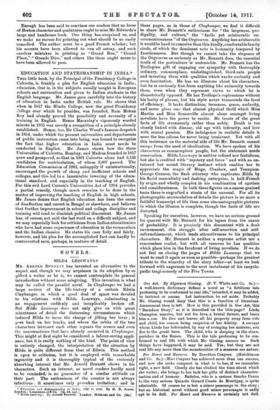NOVELS.
HILDA LESSWAYS.t
Mn. ARNOLD BENNE1T has invented an alternative to the sequel, and, though we may acquiesce in its adoption by so gifted a writer as he is, we cannot contemplate its general introduction without some misgiving. This invention is what may be called the parallel novel. In Clayhanger we had a large section of the life-history of a certain Edwin Clayhanger, in which a good deal of space was devoted to hie relations with Hilda Lessways, culminating in an engagement suddenly and inexplicably broken off. But Hilda Lessways does not only give us with great minuteness of detail the distressing circumstances which induced Hilda to incur the charge of jilting her lover ; it goes back on her tracks, and where the orbits of the two characters intersect each other repeats the scenes and even the conversations that have already occurred in Clayhanger. This might at first sight be considered a labour-saving appli- ance, but it is really nothing of the kind. The point of view is entirely changed, the interpretation of the situation by Hilda is quite different from that of Edwin. This method is open to criticism, but it is employed with remarkable ingenuity and it is thoroughly typical of the curiously absorbing interest that Mr. Arnold Bennett shows in his characters. Such an interest, as novel readers hardly need to be reminded, is no guarantee of a similar attitude on their part. The enthusiasm of the creator is not always infectious : it sometimes only provokes irritation ; and in • Education and Statesmanship in India, 1797 to 1910. By 11. B. James. London : Longmams and Co. [3a. 6d. net.] 4. Hilda Lossways. By Arnold Bonnett. London: idethwm and Co. [(46] these pages, as in those of Clayhanger, we find it difficult to share Mr. Bennett's enthusiasm for "the largeness, pro- digality, and culture," the "facile yet aristocratic un- ceremoniousness "of the Orgreaves. Anything less aristocratic it would be bard to conceive than this kindly, comfortable fam ily circle, of which the dominant note is humanity tempered by facetiousness. But though we cannot take the elegance of the Orgreaves as seriously as Mr. Bennett does, the essential truth of the portraiture is undeniable. Mr. Bennett has the Trollopian gift of engaging our sympathy with thoroughly ordinary, commonplace, undistinguished, third-rate people and investing them with qualities which excite curiosity and even fascination. He has no illusions about his characters, but he is curiously free from anything like animosity towards them, even when they represent views to which hd is diametrically opposed. He has Trollope's copiousness without his laxity of phrase, but his style never transcends the level of efficiency. It lacks distinction, terseness, grace, audacity, and never gives one that almost physical thrill which Miss Martin and Miss Somerville almost alone amongst living novelists have the power to excite. He treats of the great facts of life strenuously rather than nobly. Death is too closely linked with disease, old age with infirmity, and love with sexual passion. His indulgence in realistic details is none the less odious for never being irrelevant. -Yet with all this insistence on the material aide of life Mr. Bennett cannot escape from the need of idealization. We have spoken of his characters as commonplace people, but the statement needs reservation. Hilda Lessways is neither refined nor fastidious, but she is credited with "mystery and force" and with an un- tutored but sound literary instinct which enables her to appreciate the magic of Hugo, Crashaw, and Tennyson. George Cannon, the flash attorney who captivates Hilda by his florid masculinity and dashing enterprise, is half-French by origin and wholly complex in his combination of egotism and considerateness. In both these figures on a coarse-grained basis there is engrafted a strain of the unusual. For all its photographic accumulation of details the picture is no more a faithful transcript of life than some cinematographic pictures in which the illusion is complete, though the facts of life are distorted.
Speaking for ourselves, however, we have no serious ground for quarrel with Mr. Bennett for his lapses from the canon of probability. It is precisely this discontent with a drab environment, this struggle after self-assertion and self- enfranchisement, which lends attractiveness to his principal characters. Mr. Bennett is neither a supreme artist nor a remorseless realist, but with all reserves he has qualities which place him in the forefront of living novelists. If we do not feel on closing the pages of Hilda Lessways that we want to read it again as soon as possible—perhaps the greatest tribute to the wizardry of the story teller—at least we look forward with eagerness to the next instalment of his encyclo- pmdic tragi-comedy of the Five Towns.


















































 Previous page
Previous page